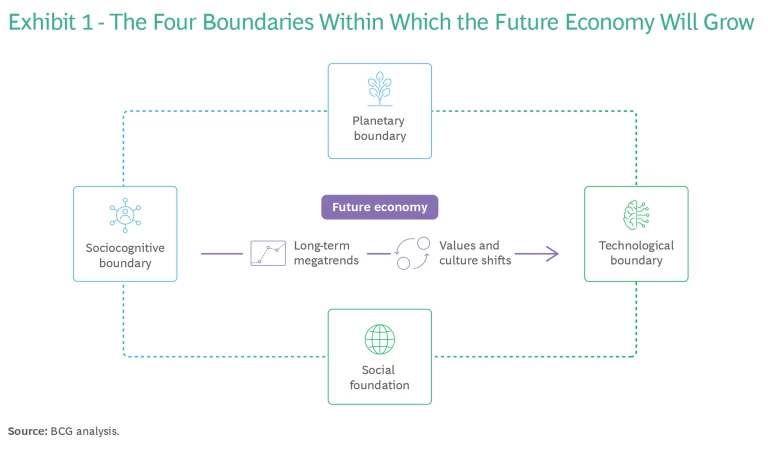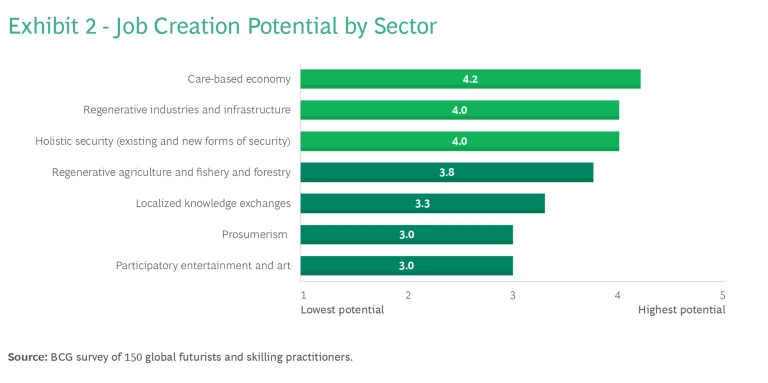What will work be like in the future? In our view, the outlook for the next 50 years calls for cautious optimism.
To build an understanding of what the next five decades may hold in store for workers, BCG engaged with more than 150 futurists through panel discussions and opinion surveys. Contrary to popular fears that the future will offer fewer work opportunities for people, most experts anticipate that rewarding work options will be plentiful. Individuals, organizations, and communities that build new skills will flourish. Economic sectors such as regenerative industries and areas that require strong creativity will offer new paths to sustainability and personal satisfaction.
Public sector organizations and their private sector partners are ideally positioned to maximize the effectiveness of human contributions to prosperity over the next 50 years. Understanding the factors that will affect the 21st-century economy and crafting future-oriented policies will ensure that populations have what they need for shared purpose and success.
Four Boundaries That Frame the Future
Over the next several years, emerging technologies and cultural transformations such as generative AI and the rising influence of younger generations will continue to change the day-to-day experience of workers. It is not inevitable, however, that these large-scale global challenges will leave organizations and communities behind.
Leaders that wish to build employment policies and business strategies to support long-term job creation must respect several boundaries—a term frequently used in discussions of the future—that frame a successful future economy. (See Exhibit 1.) Staying within these boundaries will keep communities in an environment of prosperous job cultivation. Straying outside these limits may lead society to harmful outcomes. The four critical boundaries are as follows:

- Planetary Boundary. This boundary defines the environmental health that sustains humanity and enables it to thrive. Today’s economy violates this boundary with high carbon emissions and unsustainable manufacturing processes, and the situation could get worse. A scenario in which we humans cross this boundary too frequently—or exceed it to such an extent that we reach a point of no return—could cause critical damage to the planet.
- Technological Boundary. With AI evolving at a frenetic pace, the ever-shifting line between safe and hazardous use of technology can be difficult to define. But we must keep our bearings in this terrain. If humanity loses control of its technological assets—including robotics, geo-engineering, and biotechnologies—or misuses them, it risks advancing into a setting where the damage caused becomes irreversible.
- Social Foundation. The world of the future must deliver sufficient vital resources and conditions—water, food, shelter, and peace—to satisfy humanity’s basic needs. If inadequate supplies of these elements weaken society’s economic and infrastructural foundation, the world’s stability will weaken as well.
- Sociocognitive Boundary. When truth, trust, creative expression, and other essential elements sustain our collective mental health, we can make well-informed decisions about our collective future. Fake news, disinformation, and similar trends push humanity beyond this boundary, destroying social cohesion and impeding large-scale collaboration.
The future can sustain promising economic models that thrive within these boundaries, but leaders must understand the key components of such models. We have identified five crucial elements.
Economies need to become circular and nature-friendly to comply with planetary boundaries. The energy transition is a high-visibility example of a worthwhile global effort, however fledgling, to achieve positive climate impact while balancing sustainability and reliability. Shifting to nature-friendly processes is also important. According to research published by the UN in 2021, investing 1% of global GDP in nature-based solutions would allow humanity to better face crises related to climate, biodiversity, and land degradation. For example, construction projects could use biodegradable fungi bricks that are stronger than cement for various construction projects or seaweed-based substitutes for single-use plastic.
Society can lower the risks associated with widespread adoption of a particular technology by choosing smaller, secure production and distribution models. There is a surprising answer to today’s supply chain hassles and excessively large carbon footprints: a do-it-yourself (DIY) model of production. In such a model, a company might sell digital blueprints for 3D printing and DIY assembly of products, but leave it to end users to build the product themselves—instead of supplying fully produced machines, electronics, furniture, and apparel. The results are diminished environmental impact and more flexible supply chains.
Society must stand on a positive social foundation that prioritizes collective flourishing. Innovation is key to ensuring the proper treatment of simple necessities such as food and water. One way to achieve food security is by eliminating avoidable food losses that, according to the UN, amount to 30% of all food produced. Projects such as ZeroW, an initiative dedicated to achieving zero-waste sustainability, encourage businesses to adopt concepts like wasteless greenhouses and smart packaging to produce food profitably while enabling entire populations to flourish.
A strong social foundation also requires human connections, love, and support. The Grant Study, a long-running Harvard University study of children aging into adulthood, found that good personal relationships exert a critical influence on human happiness and physical health. A lack of harmony is damaging to an individual, and it is terribly costly at scale. According to the Institute for Peace & Economics’ Global Peace Index 2023 report suggests that the impact of violence on the global economy in 2022 amounted to $17.5 trillion, or 13% of global GDP. Striving for peace is key. Business-led peacemaking—such as recent corporate commitments to reduce corruption—can serve as an extremely efficient way to boost collective flourishing.
Mental health—and its key component, creativity—should be a sociocognitive priority. Eliminating disinformation is an urgent mission around the world. But multiple studies from agencies such as the US National Institutes of Health suggest that artistic expression and craftwork can have a significant favorable impact on mental health as well. A creative economic sector will offer people ways to express themselves, communicate feelings, and connect with each other. For example, city dwellers might spend their Saturday afternoons making music or art in community settings instead of shopping. When scaled, the benefits of such a sector, including heightened interconnectedness and communication, extend throughout an urban economy and beyond.
The Most Promising Sectors of the Future Economy
When leaders build economic models based on these priorities, a range of sectors with significant job-creating potential could emerge in the long-term future. (See Exhibit 2.) Several sectors are especially noteworthy in this regard.

Care-Based Economy. Human-to-human connections will become one of the most important value-creation priorities of an economy built on collective flourishing. The connections will include traditional care for senior people, children and youth, and various underserved social groups, along with new forms such as holistic community health management and support for mental health. Our research has found that a care-based economy has the highest job creation potential of these emerging sectors.
Regenerative Industries and Infrastructure. Deploying nature-based materials and circular processes in construction and manufacturing can replace nonrenewable and linear ones. Promising areas for regenerative approaches include circular urban infrastructure , using nature-based solutions and reused materials in construction. Blue- and white-collar workers can join regenerative industries—including those dedicated to alternative energy—to replace industrial processes with sustainable methods.
Holistic Security. Rather than focusing on one risk at a time, a holistic approach to security addresses a collection of risks systematically and anticipatorily. For example, a holistic security strategy for a global supply chain firm might simultaneously respond to cybersecurity concerns (especially those related to the Internet of Things), cognitive security (protecting workers from disinformation about political events), and climate security. Because the range of security threats is constantly changing, holistic security will become one of the key job-creating sectors, offering plenty of openings to committed workers who understand a complex risk environment and develop the skills needed to manage those risks.
Regenerative Agriculture, Fishery, and Forestry. These sectors use nature-enhancing ways of producing food and natural materials. Regenerative farming is more labor-intensive than industrial agriculture, requiring greater human attention and care. Jobs will be plentiful in organic rural and urban farming, regenerative aquafarms, and rewilding of urban infrastructure.
Localized Knowledge Exchanges. Workers from different organizations will form teams and collaborate in efforts to make sense of their environment, sharing goals and practices, participating in local learning ecosystems and engaging in lifelong learning. Although competition remains a fundamental aspect of the world economy, movement toward localized knowledge sharing is already underway. For example, networks of regenerative farming communities such as the Netherlands’ Herenboeren and the US-Canadian Regenerate Cascadia venture have created community hubs to coordinate business activities and exchange information on best practices. Localized knowledge creation will require the introduction of many new roles to complement traditional knowledge-sharing channels such as media, industrial R&D, and education.
Prosumerism. Production and consumption will be linked in many communities in the form of consumers producing goods that they’ll then use or sell. In some cities of tomorrow, smaller-scale systems of production, operated and overseen by residents, will respond to other local residents’ specific needs. These smaller production systems will provide personalized products including electronics, mobile phones, medical equipment, furniture, apparel, and electric bikes. Workers versed in technologies such as AI and 3D printing will find plenty of opportunities to contribute.
Participatory Entertainment and Art. Various play- and fun-based sectors that blend entertainment, learning, care, and art will be increasingly important to future communities. The most beneficial result of these activities will be the time people spend together sharing new experiences, but lots of new jobs will emerge as well. Many forms of entertainment, including e-sports, will play out in the metaverse, which will provide an almost unlimited setting for emerging roles as the technology evolves.
To make the most of the opportunities that become available in these sectors and in transformed industries such as transportation, energy, and health care, leaders must cultivate future-friendly skill sets and mindsets in their organizations.
The Skill Set of the Future
As the global economy moves farther into the 21st century, people will refine some skills they already have and build entirely new ones. The range of relevant skills is wide, but it includes several of special importance:
- Existential Capabilities, Mindsets, and Habits. Coping with the world’s broader changes will take mindfulness, physical and emotional self-regulation, adaptability and growth, decisiveness, and optimism. These skills are universally applicable to various contexts of life, including professional settings.
- Bionic Skills. A high level of comfort in commanding technologies such as AI and robotics will be key. People will want to build their tech literacy, data-driven decision making, AI-enhanced creativity, and ease with human-machine collaboration. Workers will also need to be comfortable moving through the metaverse and other virtual reality settings.
- Creativity. Even as AI poses a challenge to some creative jobs today, human creativity will be critical as people address future problems and contribute positively to their communities and organizations. A range of skills will become more valuable over the next 50 years. These include curiosity; imagination; the ability to solve problems unconventionally; talent in storytelling; and competence with various forms of expression such as arts, video, and text.
- Human-to-Human, Team-Focused, and Community-Focused Skills. An individual’s success depends not only on effective person-to-person interaction, but also on the ability to participate productively in teams, communities, and organizations. Organizations will want to harness their employee’s institutional intelligence and wisdom for collective problem solving. Relevant skills include communication, emotional intelligence, the ability to empathize, the ability to work with others who bring diverse perspectives and cultural backgrounds to the workplace, and competence in facilitation and co-creation.
According to this research, bionic skills and creativity will be in highest demand over the next 50 years. But to complement these skills, workers should also cultivate adaptability and the ability to take initiative.
An entrepreneurial mindset will be extremely important for rebuilding economies and creating new job opportunities. While not everyone is suited to a career of advanced entrepreneurship, many people can establish themselves in gainful self-employment and can organize small-scale businesses.
Policies That Will Shape the Future of Work
Public policies and business initiatives are powerful mechanisms to help guide workforces to the right set of skills and opportunities. By putting these policies in place now, organizations ranging from local grade schools to huge regional ecosystems can help prepare people for tomorrow’s world. A number of practical policy steps can begin to yield positive results right away.
Strive for collaboration on a regional and national level. Backed with extensive resources, business-driven collaborations are proven tools for building employee skills via digital platforms and other forms of flexible learning. Many national and regional efforts already provide training that will pay off in the future. SkillsFuture Singapore, a government-sponsored movement to enable learning, is one such framework.
Prioritize continuous, lifelong development of future-ready talent. Tax deductions, grants, and other economic incentives are useful ways to encourage a population to upskill throughout life. In the same vein, building education programs on the basis of a learning ecosystem paradigm will allow public and private entities to draw from shared resources. Such future-facing ecosystems are already in place. For example, SENAI, a network of professional schools maintained by the Brazilian Confederation of Industry, focuses on developing talent in anticipation of tomorrow’s demands for skills in engineering and construction.
Use school education to help populations begin to learn early. Tech literacy should be a goal across all levels of education. In early-childhood and K-12 education, children can learn to use the metaverse, play with robots, and actively use AI in their studies and exploration of the world. Colleges and universities are ideal settings for building bionic skills in students. One example is the AI Alliance, recently founded by IBM and Meta, which is committed to spurring innovation in a network of academic institutions and will likely set educational standards for many bionic skills.
Establish a culture of dialogue and communication. This policy envisions bringing together all ages and levels of society to discuss future needs. Programs that promote empathy-based learning and nonviolent communication must be available to participants of every age and station in life. Such programs can elevate mutual understanding, inclusion, and collective mental and spiritual health.
Increase awareness of global challenges and prioritize collaborative problem solving. Through education and media campaigns, governments can spread public awareness of global challenges and help their populations confront the complexity of the future world. Governments can also focus the energy of local and global communities on various problems. For instance, contests run by the US Department of Health and Human Services have solved real-world health problems while catalyzing the formation of new companies and partnerships.
Engage early adopters of emerging skills. Many agents of future change populate today’s economies, including startup entrepreneurs, venture and impact investors, researchers, technology developers, and regulators. In Finland, the government’s innovation policies promote bottom-up ecosystem building and partnerships to cultivate tech talent, demonstrating the importance of attracting enthusiasts and early adopters to join in regional and national efforts.
Government leaders, business executives, scholars, and citizens cannot avoid the changes that will occur during the next 50 years. It is crucial to embrace a long-term view and avoid reactive policymaking that causes populations and institutions to be constantly out of step with technological and social transformations and continually threatened by rising challenges.
Adopting a proactive attitude toward the future is the key initial step in achieving desirable scenarios. Preparing for this future will create massive economic opportunities and produce large new occupational areas, allowing first movers to benefit from an early transition to the new economic paradigm and ensuring a thriving future for all.











